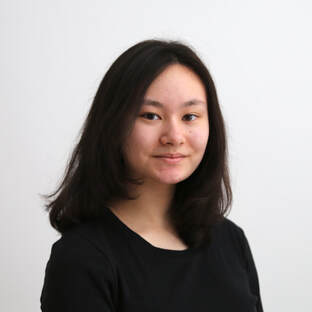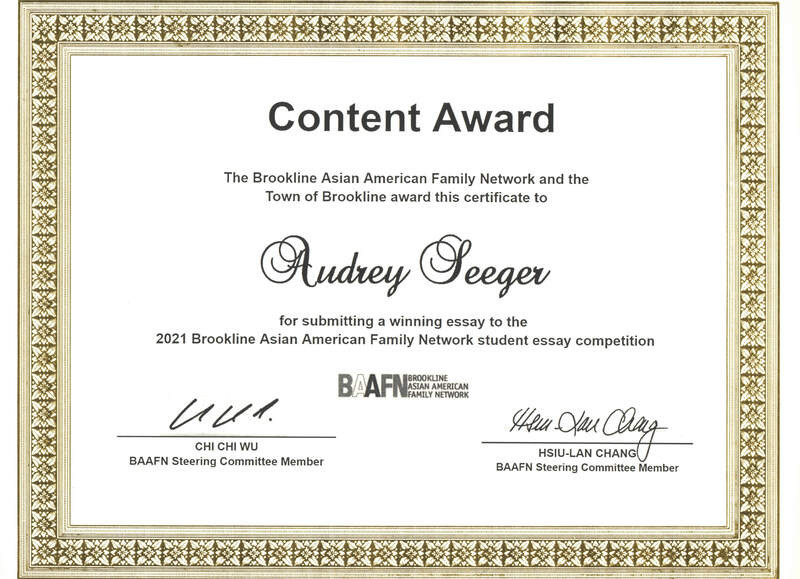2021 BAAFN Content Award
Our Filing-Cabinet Minds
by Audrey Seeger
by Audrey Seeger
I’ve always been a solitary person, but the isolation from social life that the pandemic has pushed upon us has granted me too much time to stare into empty space and entertain my philosophical musings to the fullest. Though these thoughts range from the possible existence of supernatural forces to the ever–persisting debate on whether or not water is wet, a contemplation that always seems to return to the forefront of these one–sided discussions is the question: “what is it with humans’ tendency to simplify everything?”
As a statement, this is indisputably true; from the shorthand used to take notes and compose a text message to the “not to scale” disclaimers for that mathematical diagram to the meticulous organization of filing–cabinet folders, we always feel the unconscious need to compress, change, and categorize things for them to make sense to us and save effort on our individual part. We see something, we simplify it, we mentally slap a couple of labels on it and tuck it away in our filing–cabinet brains—even if that “something” doesn’t fully match any of the pre–existing categories.
This simplified system of thinking gives rise to one of today’s global issues. Untrue and harmful stereotypes result in the mass generalizations of groups of people. Individuals are given reputations they never asked for—some are blamed for crimes they didn’t commit, some are held to unrealistic standards, and others are deemed inferior though they have never been granted the chance to prove themselves. All are judged on the basis of race, gender, sexuality, ability—what they cannot control.
And where do I come in? Into which drawer, which crisp manila folder am I stuffed into?
Growing up, my worldview was extremely limited. I was only aware of the cabinet’s outline. I thought everyone was like me and shared the same experiences. I was therefore stunned to discover that most of my American peers had never tasted xiaolongbao or scallion pancake, didn’t have to travel to the other side of the world to visit their grandparents, and ate rice with a fork. But I was even more astonished to discover that I also didn’t fit in with those who did share my Asian experiences—because I wasn’t Asian enough. Because my hair is a couple shades too brown, my nose too triangular, my eyes too wide. I could speak about three phrases in Chinese, ate ham–and–cheese sandwiches for lunch, and really wasn’t in touch with much of modern Asian culture. For white people, I feel shunted into the Asian folder; for Asian people, into the white one. For me…
I’m in both folders, and neither at the same time. I call myself half–and–half, an east–west smoothie, cheese and crackers on a platter. For me, that is satisfactory—until I begin to question my validity as either race and the carefully constructed image crashes to the ground again.
Because no matter how I choose to see myself, if others can only see me as one or the other, there is no room in their vision for my in–between. I cannot choose how others see me, nor where I will be filed in the cabinets of their minds. So maybe it’s time for me to return to the lesson of an old, cliché picture–book moral: “be yourself and ignore anyone who says you’re anything else.” If I am confident in my own identity, then I can fully embrace my heritage and culture—especially on my mom’s Taiwanese side.
I’ll never be able to completely disregard where I land in the filing cabinets of others. However, I believe this is an idea that shouldn’t be disregarded. The first stage of change is awareness, and if we recognize people’s tendency to categorize, we will then be prepared to knock down the clunky cabinet and replace it with a graceful spectrum, and open people’s eyes to the true limitlessness of human diversity.
As a statement, this is indisputably true; from the shorthand used to take notes and compose a text message to the “not to scale” disclaimers for that mathematical diagram to the meticulous organization of filing–cabinet folders, we always feel the unconscious need to compress, change, and categorize things for them to make sense to us and save effort on our individual part. We see something, we simplify it, we mentally slap a couple of labels on it and tuck it away in our filing–cabinet brains—even if that “something” doesn’t fully match any of the pre–existing categories.
This simplified system of thinking gives rise to one of today’s global issues. Untrue and harmful stereotypes result in the mass generalizations of groups of people. Individuals are given reputations they never asked for—some are blamed for crimes they didn’t commit, some are held to unrealistic standards, and others are deemed inferior though they have never been granted the chance to prove themselves. All are judged on the basis of race, gender, sexuality, ability—what they cannot control.
And where do I come in? Into which drawer, which crisp manila folder am I stuffed into?
Growing up, my worldview was extremely limited. I was only aware of the cabinet’s outline. I thought everyone was like me and shared the same experiences. I was therefore stunned to discover that most of my American peers had never tasted xiaolongbao or scallion pancake, didn’t have to travel to the other side of the world to visit their grandparents, and ate rice with a fork. But I was even more astonished to discover that I also didn’t fit in with those who did share my Asian experiences—because I wasn’t Asian enough. Because my hair is a couple shades too brown, my nose too triangular, my eyes too wide. I could speak about three phrases in Chinese, ate ham–and–cheese sandwiches for lunch, and really wasn’t in touch with much of modern Asian culture. For white people, I feel shunted into the Asian folder; for Asian people, into the white one. For me…
I’m in both folders, and neither at the same time. I call myself half–and–half, an east–west smoothie, cheese and crackers on a platter. For me, that is satisfactory—until I begin to question my validity as either race and the carefully constructed image crashes to the ground again.
Because no matter how I choose to see myself, if others can only see me as one or the other, there is no room in their vision for my in–between. I cannot choose how others see me, nor where I will be filed in the cabinets of their minds. So maybe it’s time for me to return to the lesson of an old, cliché picture–book moral: “be yourself and ignore anyone who says you’re anything else.” If I am confident in my own identity, then I can fully embrace my heritage and culture—especially on my mom’s Taiwanese side.
I’ll never be able to completely disregard where I land in the filing cabinets of others. However, I believe this is an idea that shouldn’t be disregarded. The first stage of change is awareness, and if we recognize people’s tendency to categorize, we will then be prepared to knock down the clunky cabinet and replace it with a graceful spectrum, and open people’s eyes to the true limitlessness of human diversity.



